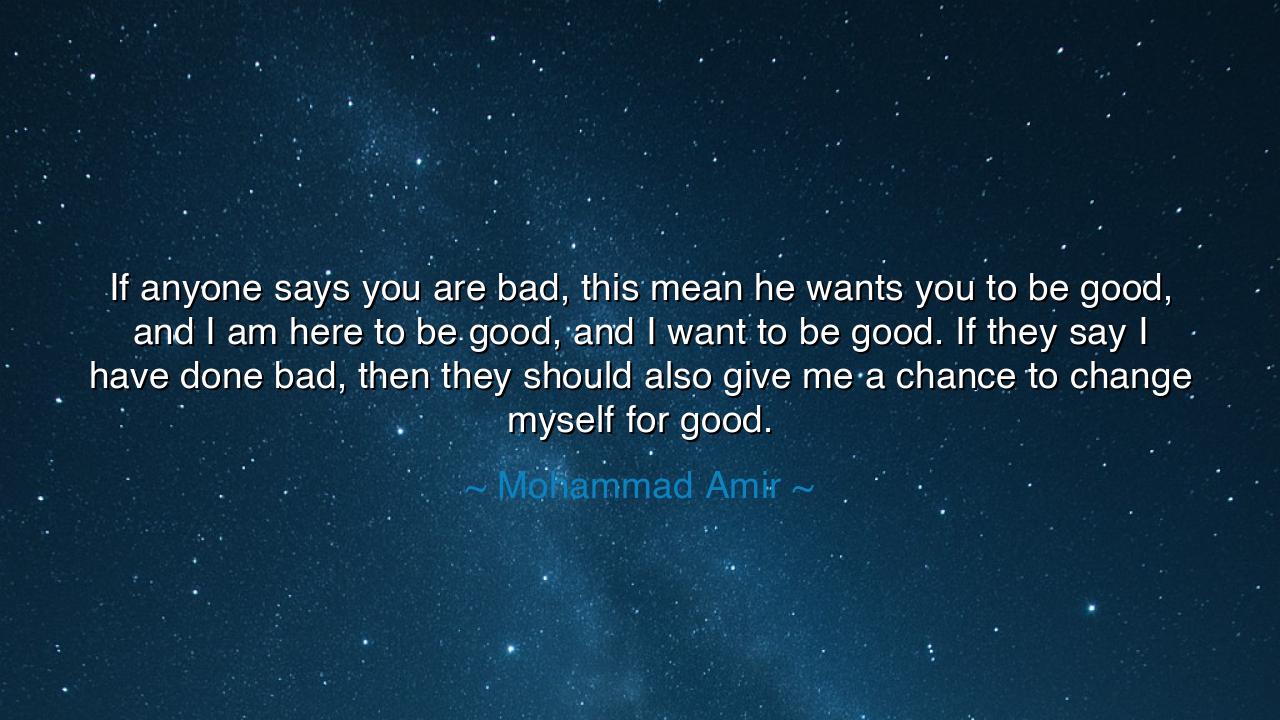
If anyone says you are bad, this mean he wants you to be good
If anyone says you are bad, this mean he wants you to be good, and I am here to be good, and I want to be good. If they say I have done bad, then they should also give me a chance to change myself for good.






In the great journey of life, few things are as powerful as the desire to change, to grow, and to improve. Mohammad Amir, a man whose life has been shaped by both triumph and controversy, once shared these deeply meaningful words: "If anyone says you are bad, this means he wants you to be good, and I am here to be good, and I want to be good. If they say I have done bad, then they should also give me a chance to change myself for good." In these words, Amir reveals the ancient truth that criticism, when offered with good intent, is not an attack but a call to become better, and that every soul deserves a chance at redemption and self-improvement.
The ancient philosophers, from Socrates to Aristotle, recognized that the journey to becoming a virtuous and wise person is not a path without setbacks. Socrates famously declared that “the unexamined life is not worth living,” pointing to the idea that to improve, one must constantly evaluate and learn from their mistakes. The very act of criticism, then, is a necessary part of the human process of growth. It is not the blame that matters, but the opportunity it offers to reflect, to change, and to transform into a better version of oneself. Amir’s plea for a chance to change underscores this ancient wisdom—we are not defined by our mistakes, but by our ability to learn from them and strive toward goodness.
Consider the story of Cicero, the great Roman philosopher and orator. Though his political career was filled with great successes, it was also marked by his fall from favor and moments of failure. Yet, Cicero did not allow his mistakes to define him. Instead, he took each criticism and setback as an opportunity to re-evaluate his actions and better his character. Amir, too, in his desire to be good, mirrors this ancient approach: the path to virtue is not about avoiding failure, but about accepting it as a chance to become better. Cicero’s life teaches us that growth comes not from denying our mistakes, but from embracing them and using them as stepping stones toward a higher goal.
In the biblical tradition, we see a similar call for redemption and the opportunity for personal transformation. The story of Saul of Tarsus, who became the Apostle Paul, is one of the most powerful narratives of change. Saul was once a fierce persecutor of early Christians, but through a profound moment of reflection—a literal and metaphorical fall from grace—he was given the chance to change his ways and become one of Christianity's most influential advocates. This story, much like Amir’s, shows that it is not the wrongdoing that defines us, but our willingness to transform and seek redemption. Amir, like Paul, recognizes that mistakes are inevitable, but the true measure of a person lies in their ability to seek goodness and to change their ways.
The lesson Amir imparts is a deeply human one: no matter the wrongs we have committed, no matter the mistakes of our past, we are always capable of change. Criticism, when offered with love or concern, should not be seen as an indictment of our character but as an invitation to rise above our flaws. This understanding is at the heart of what it means to be human—to acknowledge our imperfections and still choose the path of growth. Just as Amir asks for a chance to change and be better, we too must recognize that no one is beyond the opportunity for transformation. Kindness and forgiveness should be extended to those who wish to improve, for it is only through such compassion that the cycle of self-improvement can continue.
In your own life, reflect on the moments when you have been criticized, when others have pointed out your flaws. Do you see those moments as opportunities to grow, or do you view them as attacks on your character? The challenge Amir offers us is to embrace criticism not as a condemnation, but as a call to evolve, to learn, and to become better. Like the ancient philosophers and heroes who faced their own failures with humility, we too must be willing to acknowledge our imperfections and strive toward a better future. Transformation is not an easy path, but it is one that we must walk if we are to reach our full potential.
So, as you continue on your journey, remember the words of Mohammad Amir and the wisdom of the ancients: growth is not about perfection, but about the willingness to change and to seek goodness even after we have faltered. The mistakes of the past do not have to define our future, and criticism should not be feared but welcomed as the tool it is—one that sharpens us, molds us, and helps us become the people we are meant to be. Just as Socrates, Cicero, and countless others knew, the greatest virtue lies in the constant pursuit of improvement, and the humility to recognize that we are always capable of becoming better. Let your failures fuel your growth, and may you always seek the path of redemption and change.






AAdministratorAdministrator
Welcome, honored guests. Please leave a comment, we will respond soon